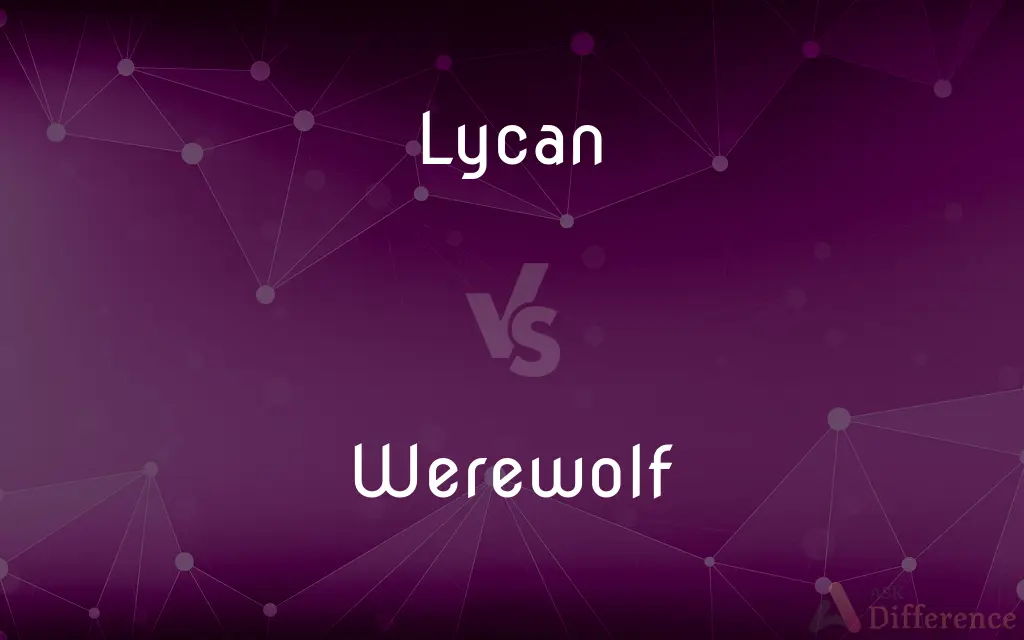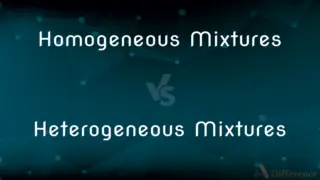Lycan vs. Werewolf — What's the Difference?
Edited by Tayyaba Rehman — By Fiza Rafique — Published on October 2, 2023
Both lycans and werewolves refer to mythological creatures that can transform from humans into wolves, but "lycan" is often used to denote beings with more control over their transformations, while "werewolf" typically suggests involuntary shifts during f

Difference Between Lycan and Werewolf
Table of Contents
ADVERTISEMENT
Key Differences
Lycans and werewolves, throughout various folklore and pop culture, are creatures with the unique ability to shift from human to wolf. While the term "lycan" is derived from "lycanthrope," which broadly means a human who can change into an animal, the term specifically connotes a being with greater autonomy over its metamorphosis. Conversely, the classic werewolf is often bound to the lunar cycle, transforming during the full moon.
In many stories, lycans retain a significant amount of their human consciousness and cognitive abilities even in their wolf form. This contrasts with the traditional werewolf narrative, where the individual becomes a feral beast, often with no recollection of their actions upon reverting to their human state.
Appearance-wise, lycans and werewolves can vary, depending on the source material. Lycans might be depicted as larger and more anthropomorphic, bearing a blend of human and wolf characteristics. Werewolves, on the other hand, often appear as regular wolves or slightly larger versions, especially during their transformation driven by the full moon.
Origins and mythologies surrounding both lycans and werewolves have deep roots in various cultures. While the lycan terminology has a more modern and specific connotation, especially in pop culture, the werewolf mythos can be traced back to ancient civilizations, including the Greeks and Romans.
In modern portrayals, especially in movies and literature, lycans and werewolves may have distinct societies, abilities, and vulnerabilities. While silver is famously believed to harm werewolves, lycans might not share the same weakness, showcasing yet another divergence between the two.
ADVERTISEMENT
Comparison Chart
Origin of Term
From "lycanthrope", meaning human-animal shifter
Old English "werwulf", man-wolf
Transformation Control
Often have control over transformations
Typically involuntary during full moons
Consciousness in Wolf Form
Often retain human awareness
Usually become feral
Appearance
Blend of human-wolf features
Often like regular wolves or larger
Cultural Roots
More modern/pop culture-oriented
Ancient, with tales from various cultures
Compare with Definitions
Lycan
May possess a blend of human and wolf physical characteristics.
The lycan stood tall, with humanoid features but sharp claws and fangs.
Werewolf
A mythical creature that can shift between human and wolf forms.
The lycan roamed the woods, balancing its human intellect with its wolf instincts.
Lycan
Often a being with greater autonomy over its transformations than werewolves.
Unlike werewolves, the lycan could choose when to become a wolf.
Werewolf
Often a being with greater autonomy over its transformations than werewolves.
Unlike werewolves, the lycan could choose when to become a wolf.
Lycan
Generally retains human consciousness even in wolf form.
Even as a wolf, the lycan remembered its human life and emotions.
Werewolf
May possess a blend of human and wolf physical characteristics.
The lycan stood tall, with humanoid features but sharp claws and fangs.
Lycan
A more modern and specific term often used in pop culture.
The movie depicted a war between lycans and vampires.
Werewolf
Typically has vulnerabilities, like harm from silver.
Armed with a silver bullet, she was ready to face the werewolf.
Lycan
A mythical creature that can shift between human and wolf forms.
The lycan roamed the woods, balancing its human intellect with its wolf instincts.
Werewolf
Generally retains human consciousness even in wolf form.
Even as a wolf, the lycan remembered its human life and emotions.
Lycan
(literary) A werewolf.
Werewolf
A more modern and specific term often used in pop culture.
The movie depicted a war between lycans and vampires.
Werewolf
Often becomes a feral beast with little to no human cognition during transformation.
Once a man, the werewolf now hunted in the woods, driven by primal urges.
Werewolf
A person who transforms into a wolf, especially during a full moon.
The villagers feared the werewolf that appeared every full moon.
Werewolf
A creature with ancient mythological roots from various cultures.
The legend of the werewolf has been told for centuries.
Werewolf
Usually transforms involuntarily, driven by external factors.
The impending full moon meant the werewolf would soon emerge.
Werewolf
A person believed to have been transformed into a wolf or to be capable of assuming the form of a wolf.
Werewolf
(mythology) A person who is transformed or can transform into a wolf or a wolflike human, often said to transform during a full moon. Category:en:Horror
Werewolf
A person transformed into a wolf in form and appetite, either temporarily or permanently, whether by supernatural influences, by witchcraft, or voluntarily; a lycanthrope. Belief in werewolves, formerly general, is not now extinct.
The werwolf went about his prey.
The brutes that wear our form and face,The werewolves of the human race.
Werewolf
A monster able to change appearance from human to wolf
Common Curiosities
Is the term "lycan" ancient like "werewolf"?
No, while "lycan" is derived from "lycanthrope", its specific usage is more modern, especially in pop culture.
Do werewolves remember their actions as wolves?
Traditionally, werewolves become feral in wolf form and may not recall their actions upon reverting to human form.
What is a lycan?
A lycan is a being, often from modern stories, that can transform between human and wolf, usually with control over its shifts.
Are lycans vulnerable to silver like werewolves?
In many tales, lycans might not share werewolves' weakness to silver, but it varies by portrayal.
Where did the werewolf myth originate?
Werewolf myths date back to ancient civilizations, with tales from Greek, Roman, and other cultures.
Do lycans have a specific origin story?
Lycan backgrounds often depend on the specific story or movie, with many modern tales providing unique origin stories.
What's the significance of the full moon for werewolves?
The full moon traditionally triggers the involuntary transformation of individuals into werewolves.
Are werewolves always portrayed as evil?
While many tales depict werewolves as dangerous, some stories show them as tragic figures or even heroes.
How does a werewolf differ from a lycan?
While both can shift into wolves, werewolves typically transform involuntarily during full moons, whereas lycans often have more control over their changes.
Can lycans shift into animals other than wolves?
Typically, lycans are associated with wolf transformations, but the broader term "lycanthrope" can refer to other animal shifts.
Can lycans communicate in wolf form?
Often, lycans retain human consciousness and might communicate or showcase more strategic behaviors than werewolves.
How can one become a werewolf?
Traditional lore suggests bites, curses, or specific rituals can turn someone into a werewolf.
How are lycans and werewolves typically portrayed in pop culture?
They're often depicted in supernatural settings, sometimes in conflict with other beings like vampires.
Are there tales of lycans and werewolves coexisting?
Yes, some stories, especially modern ones, might depict conflicts or alliances between the two groups.
Are there real-life conditions related to werewolf myths?
Some suggest that medical conditions, like hypertrichosis (excessive hair growth), could have inspired werewolf tales.
Share Your Discovery

Previous Comparison
Homogeneous Mixtures vs. Heterogeneous Mixtures
Next Comparison
Crippled vs. WalkingAuthor Spotlight
Written by
Fiza RafiqueFiza Rafique is a skilled content writer at AskDifference.com, where she meticulously refines and enhances written pieces. Drawing from her vast editorial expertise, Fiza ensures clarity, accuracy, and precision in every article. Passionate about language, she continually seeks to elevate the quality of content for readers worldwide.
Edited by
Tayyaba RehmanTayyaba Rehman is a distinguished writer, currently serving as a primary contributor to askdifference.com. As a researcher in semantics and etymology, Tayyaba's passion for the complexity of languages and their distinctions has found a perfect home on the platform. Tayyaba delves into the intricacies of language, distinguishing between commonly confused words and phrases, thereby providing clarity for readers worldwide.
















































